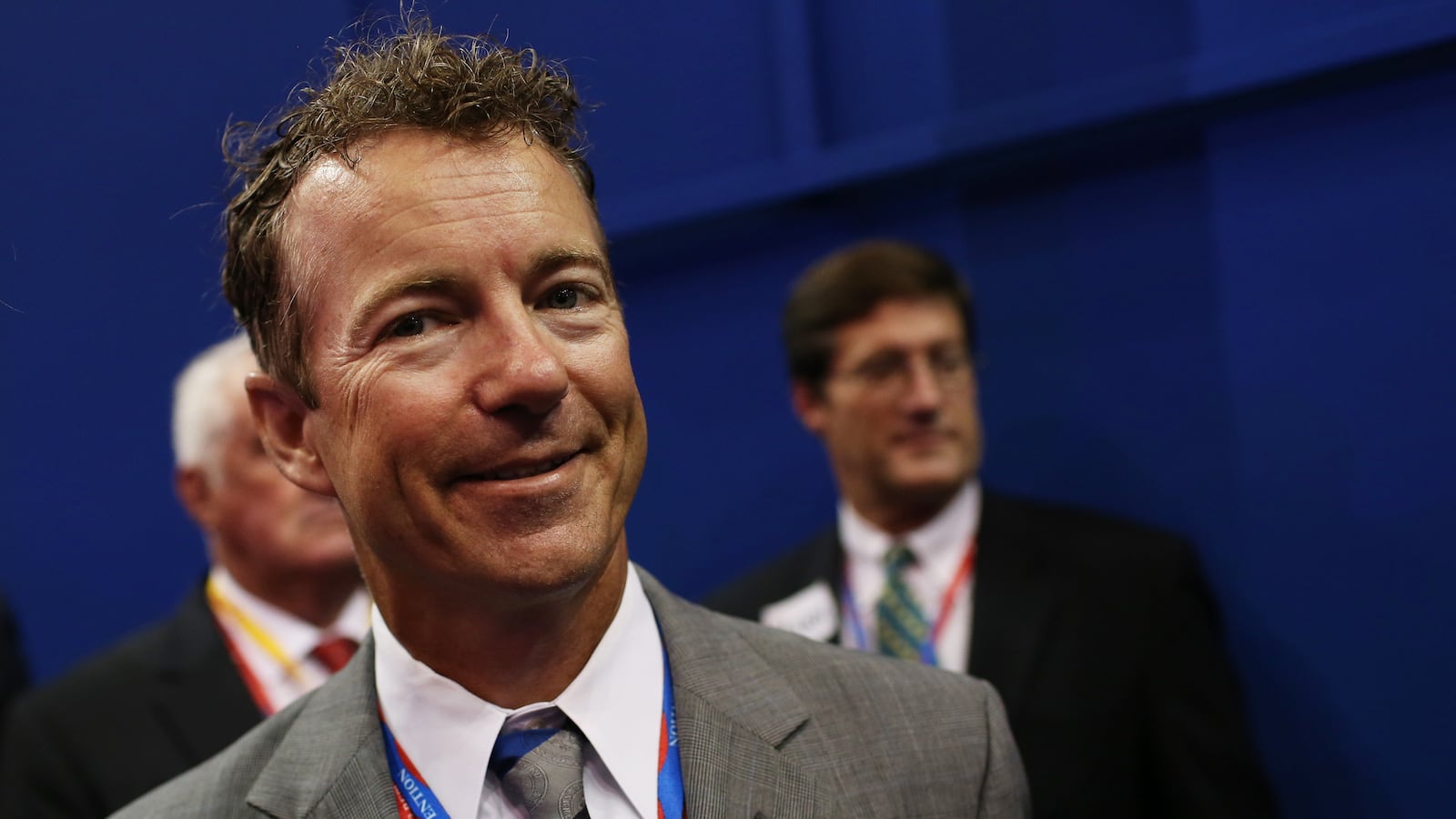A bit of advice for Republican establishment types: Stockpile your Valium for March 2016.
That’s because the Republican National Committee codified a presidential primary schedule this month that requires Iowa, New Hampshire, South Carolina, and Nevada to hold their votes first. And Republicans from both inside and outside the establishment wing of the party say that calendar will provide a huge advantage to Kentucky Sen. Rand Paul and his legion of Tea Party acolytes.

Paul has generated positive headlines with a pivot away from party orthodoxy in recent months. But with his views on foreign policy, criminal justice, and the economy, he may struggle to win over the bulk of a party that associates him with the its libertarian fringe, led for several decades by his father, former Rep. Ron Paul.
But those same ties give Paul an advantage in three of the early primary states, and if the senator were to win or even put together a decent showing there, Republicans say he may have momentum that is impossible to slow. No Republican has won Iowa and New Hampshire and failed to win the nomination.
“If Rand were to win two of those first three or three of those first four, he would be a train gathering a lot of steam,” said Matt Mackowiak, a Texas-based Republican consultant and a veteran of George W. Bush’s reelection campaign. Such a string, Mackowiak added, would raise a number of questions for party chairs and donors.
“Is he electable in the general [election], and how does he meet the commander in chief threshold?” he said. “There is a downside to being interesting.”
Paul’s advantage in three of the first primary states—he is not thought to have much of a chance in evangelical South Carolina—varies by geography. In Iowa, he can boast a superior organization, one largely left over from his father’s two runs for the nomination. In March, Paul’s political action committee, RANDPAC, hired the state Republican Party chairman to serve as a political adviser, and foot soldiers from the Paul army have been gradually taking over the party machinery.
“He already has his team in place in Iowa,” said Chris LaCivita, a Republican strategist who worked on Paul’s 2010 Senate bid. “I don’t know too many presidential candidates who can say that in May of 2014.”
In independent-minded New Hampshire, Paul is thought to be a better fit with Republican voters, and he is leading in a series of early polls in the state, even besting New Hampshire Sen. Kelly Ayotte and the better-known Jeb Bush.
“There is no question that Senator Paul starts out with some early advantages. There is a natural base of support from his father’s two campaigns,” said Jim Merrill, a senior adviser to Mitt Romney’s 2012 campaign. “Every other candidate has to build one.”
Plus, Merrill added, “There is a strong libertarian streak here. I think the messaging on privacy and the NSA really resonates.”
In Nevada, a caucus system allows for candidates with a superior organization to upset more mainstream opponents. In 2008, for example, Romney was in fifth place in polls heading into Election Day and went on to win. One GOP strategist associated with the party’s establishment told The Daily Beast that while Nevada can be something of a “jump ball,” Paul should have such an advantage there that “it would be surprising to even see the other candidates campaign much.”
Republican leaders from other states, including Florida, Texas, and Michigan, had talked about trying to move their primaries up in the calendar, but ultimately the RNC prevailed upon the state parties to stick to the national party-approved calendar. Any one of those big states could be counted on to slow Paul’s presidential momentum should he jump out to an early lead.
But the schedule is not the only possible advantage for Paul in 2016. The committee also mandated that every state assign delegates based on a proportion of the vote won, rather than on the winner-take-all primaries of years past. And Paul’s likely ability to bring a committed core of supporters to the polls in most states means that he will be able to compile delegates methodically, much as Barack Obama did in 2008.
Of course, no one can discuss the 2016 presidential race without massive caveats about handicapping a race at least six months before a single candidate has declared. But the Champagne-popping in the Paulite corridors has not gone unnoticed.
Right now, a number of candidates, including Jeb Bush, Chris Christie, and Rick Perry, are vying for the support of the GOP establishment and the well-heeled New York and California business types whose checks are necessary. If Paul looks like he may run away with the nomination early, however, party insiders say the “Stop Rand” sentiment will start to grow.
“The money people don’t like unpredictability,” said Mackowiak. “They want a mainstream, pro-business candidate that they can get behind and be confident can be the nominee and beat Hillary Clinton. It’s a question if they will accept him as a nominee.”
For Paul especially, proving his viability in the handful of states fortunate enough to vote before everyone else in 2016 will not be the same as winning the White House—or being president.
“In the end, he is a bad fit for the mass of the Republican voting bloc, and in the end you need to win over a majority,” said Brad Todd, a Republican consultant. “He has views that are well outside the Republican Party, never mind the country. That is a high hurdle for him.”





